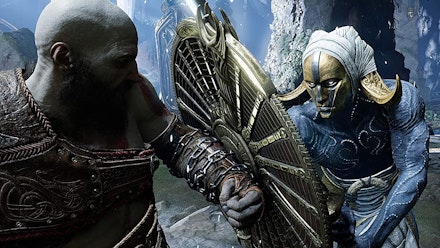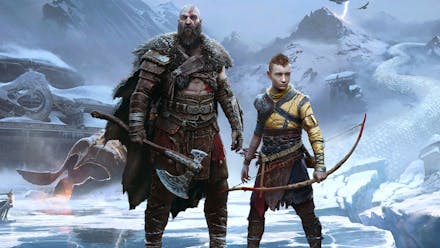Platforms: PS5, PS4
The resurgent God Of War series has always felt a bit anachronistic in places. Deicidal Kratos's journey through grief and growth could almost be pulled from a present day psychologist's couch, even as he's tearing up mythic figures from antiquity as a particularly gory form of catharsis. So, too, has it blurred cultures and identities – his son Atreus has a notably American accent, the severed head of companion Mimir boasts a broad Scottish twang, and that’s to say nothing of Kratos' own roots in Greece. Despite its medieval visual trappings, the series has always been a melange of periods, influences, and ideas.

Despite all that, we're not sure that anything could have prepared us for Ragnarök's interpretation of the Norse pantheon as, essentially, the mafia, with Odin as the Godfather – complete with an offer Kratos can't refuse. Following the murderous events of the last game, that offer is "stay out of our business and we'll make life easy for you". Spoiler: it is refused, and soon Kratos and Atreus are traipsing the Nine Realms, searching for lost gods and attempting to forge their own destinies in the face of a preordained apocalypse, all while seeking answers to questions raised about Atreus at the end of the last entry.
Like its predecessor, Ragnarök proves a surprisingly personal and often emotional saga.
It’s captivating stuff, but it does mean continuity weighs heavily on Ragnarök. While developer Santa Monica Studio offers a recap of the previous game, this is very much a direct continuation, with characters frequently referencing the events of the previous adventure. Coming to it blind is not recommended – even mythology buffs will be thrown off by Ragnarök's liberal interpretations of the Aesir and Vanir gods (although it’s often hews closer to the myths than Marvel’s Thor).
However, much like its predecessor, Ragnarök also proves a surprisingly personal and often emotional saga, between the high fantasy tropes and inevitable bloodshed. Where 2018’s God Of War was centred on Kratos and Atreus forging a father-son relationship in the wake of Atreus’ mother Faye’s death – to the point the game was affectionately nicknamed “Dad of War” – Ragnarök is more about Atreus’ awkward teenage years. He’s older now, more self-assured, but with the brazen cockiness that comes with adolescence. This is ultimately a game about a son’s desire to walk his own path, and a father having to learn to let go.

Sometimes, that’s literally. While Ragnarök rests on the same formula of Kratos and Atreus navigating environments and battles by relying on each other’s unique skills, there are plenty of sections where father and son will be separated, paired with other characters filling the void of the absent character’s roles. It’s a nice way to explore the dynamic between the core duo, by breaking them apart and seeing how they function without the other.
Unfortunately, sections focusing on Atreus do suffer from being more linear and slower than Kratos-focused ones – the young lad’s archery skills feel less elegantly incorporated into a game tailored for the father’s brutal array of physical attacks. It’s a shame, as Kratos’ suite of savage melee attacks, ice-powered Leviathan Axe, fiery Blades of Chaos, and rage-fuelled specials feel even better than before, making Atreus slightly underdeveloped by contrast. Kratos offers a significant number of skills and combos to master, and although some are fiddlier than they should be – counter-attacks to execute while also evading, for instance – they mean combat is never boring.
Kratos also has a few new tricks up his sleeve. In battle, his core weapons feel more versatile than ever, thanks to both customisable magic upgrades – with Runes placed in light and heavy attack slots to modify stats and abilities – and signature weapon skills to unleash more powerful attacks. It’s a tad too fiddly to switch between axe and blades though, which disappoints given their respective elemental attributes can ostensibly be woven together; freezing enemies with the axe and then burning them with the blades, for instance. His shield skills also get an upgrade – parries now feel more effective, and there’s a wider array of shields to equip, each tweaking the experience in battle with unique abilities of their own.

Out of combat, the chained Blades of Chaos can now be used like grappling hooks, helping to traverse gaps or tug at distant obstacles, which allows for more imaginative exploration of the world. And what a world – or worlds, rather – to explore: Ragnarök is easily one of the most beautiful games on PlayStation, taking players on a breathtaking tour from icy Nordic Midgard to the imposing Elven cities, lush wetlands, and other striking sights of the Nine Realms. It’s almost a shame that the fixed over-the-shoulder camera perspective of the first game returns – while it offers the same ‘one extended take’ approach to the game’s story, it also feels too closed in at times, stealing grandeur from moments and settings that deserve more.
Crafting and upgrading is one of Ragnarök’s weaker aspects though. While both characters’ armour and weapons can be enhanced, the resources necessary to do so feel too scarce, and not even in a clever way that forces the player to think carefully about which upgrade to purchase or item to craft. Instead, it feels more like you’re struggling to afford anything, often leaving you with underpowered gear as you venture into new territory filled with tougher foes. Similarly, character skills – unlocked through spending experience points – feel restricted, with miserly amounts of experience earned for most encounters.
Still, perhaps more than any other ‘cinematic’ game, Ragnarök trades on spectacle above all else, and on this front Santa Monica Studio has outdone itself to the point that occasional faults and frustrations in other areas can be forgiven. Even regular battles have a flair to them that outdoes almost any other comparable title, while boss battles and several key sequences are simply on another level, presenting the sheer power and terrifying capabilities of the gods in all their awesome might. Paired with sensational performances from its cast – Christopher Judge’s snarling yet understated Kratos chief among them – and a script that proves wickedly funny as often as it does deeply emotional, God Of War Ragnarök manages that rarest of feats: it absolutely nails the ending to an epic story.
